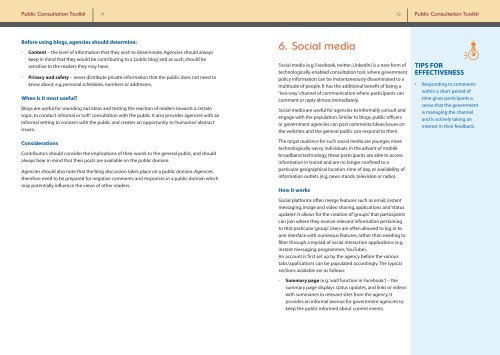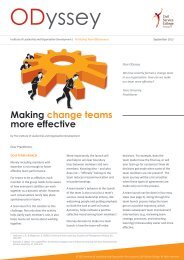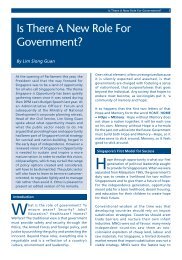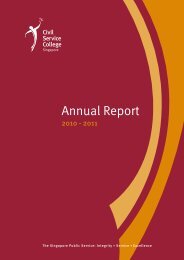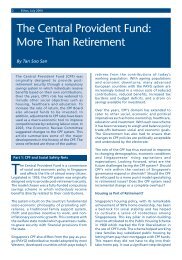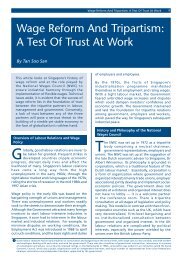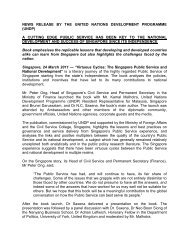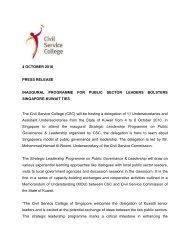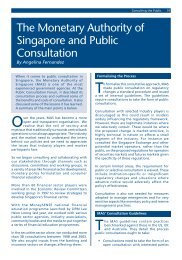Public Consultation Toolkit - Civil Service College
Public Consultation Toolkit - Civil Service College
Public Consultation Toolkit - Civil Service College
You also want an ePaper? Increase the reach of your titles
YUMPU automatically turns print PDFs into web optimized ePapers that Google loves.
<strong>Public</strong> <strong>Consultation</strong> <strong>Toolkit</strong> 71 72 <strong>Public</strong> <strong>Consultation</strong> <strong>Toolkit</strong><br />
Before using blogs, agencies should determine:<br />
• Content – the level of information that they wish to disseminate. Agencies should always<br />
keep in mind that they would be contributing to a ‘public blog’ and as such, should be<br />
sensitive to the readers they may have.<br />
• Privacy and safety – never distribute private information that the public does not need to<br />
know about, e.g. personal schedules, numbers or addresses.<br />
When is it most useful?<br />
Blogs are useful for sounding out ideas and testing the reaction of readers towards a certain<br />
topic, to conduct informal or ‘soft’ consultation with the public. It also provides agencies with an<br />
informal setting to connect with the public and creates an opportunity to ‘humanise’ abstract<br />
issues.<br />
Considerations<br />
Contributors should consider the implications of their words to the general public, and should<br />
always bear in mind that their posts are available on the public domain.<br />
Agencies should also note that the blog discussion takes place on a public domain. Agencies<br />
therefore need to be prepared for negative comments and responses in a public domain which<br />
may potentially influence the views of other readers.<br />
6. Social media<br />
Social media (e.g. Facebook, twitter, LinkedIn) is a new form of<br />
technologically-enabled consultation tool, where government<br />
policy information can be instantaneously disseminated to a<br />
multitude of people. It has the additional benefit of being a<br />
‘two-way’ channel of communication where participants can<br />
comment or reply almost immediately.<br />
Social media are useful for agencies to informally consult and<br />
engage with the population. Similar to blogs, public officers<br />
or government agencies can post comments/ideas/issues on<br />
the websites and the general public can respond to them.<br />
The target audience for such social media are younger, more<br />
technologically-savvy individuals. In the advent of mobile<br />
broadband technology, these participants are able to access<br />
information in transit and are no longer confined to a<br />
particular geographical location, time of day, or availability of<br />
information outlets (e.g. news stands, television or radio).<br />
How it works<br />
Social platforms often merge features such as email, instant<br />
messaging, image and video sharing, applications and ‘status<br />
updates’. It allows for the creation of ‘groups’ that participants<br />
can join where they receive relevant information pertaining<br />
to that particular ‘group’. Users are often allowed to log in to<br />
one interface with numerous features, rather than needing to<br />
filter through a myriad of social interaction applications (e.g.<br />
instant messaging programmes, YouTube).<br />
An account is first set up by the agency before the various<br />
tabs/applications can be populated accordingly. The typical<br />
sections available are as follows:<br />
• Summary page (e.g. ‘wall function in Facebook’) – the<br />
summary page displays status updates, and links or videos<br />
with summaries to relevant sites from the agency. It<br />
provides an informal avenue for government agencies to<br />
keep the public informed about current events.<br />
TIPS FOR<br />
EFFECTIVENESS<br />
• Responding to comments<br />
within a short period of<br />
time gives participants a<br />
sense that the government<br />
is managing the channel<br />
and is actively taking an<br />
interest in their feedback.


